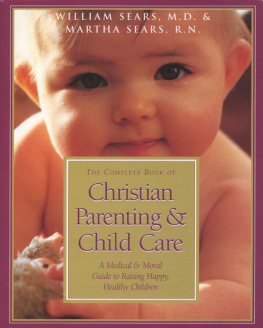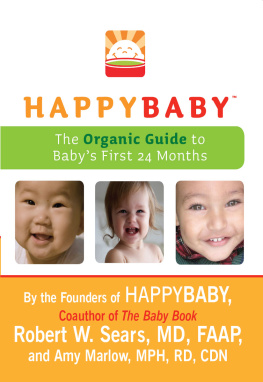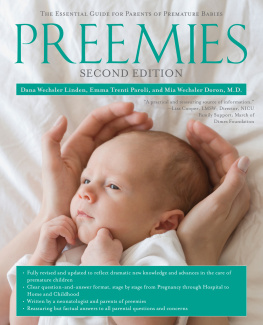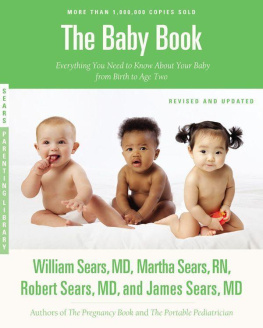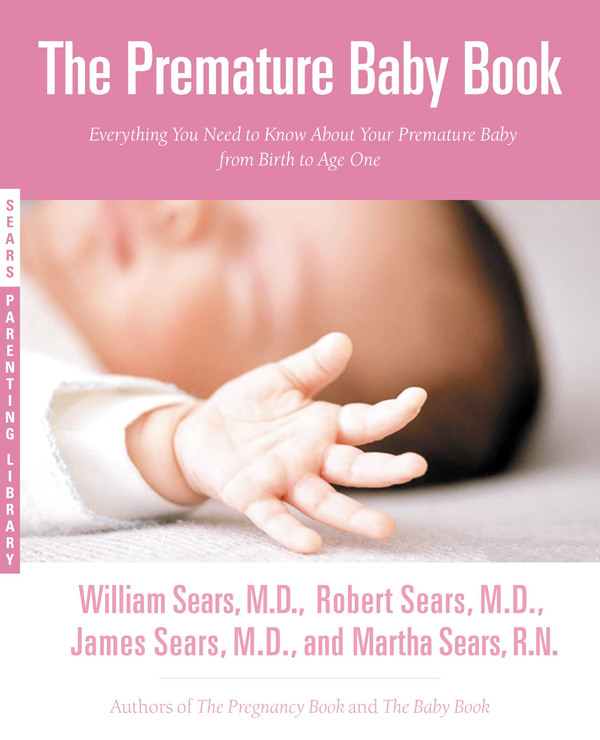COPYRIGHT 2004 BY WILLIAM SEARS AND MARTHA SEARS
ALL RIGHTS RESERVED. NO PART OF THIS BOOK MAY BE REPRODUCED IN ANY FORM OR BY ANY ELECTRONIC OR MECHANICAL MEANS, INCLUDING INFORMATION STORAGE AND RETRIEVAL SYSTEMS, WITHOUT PERMISSION IN WRITING FROM THE PUBLISHER, EXCEPT BY A REVIEWER WHO MAY QUOTE BRIEF PASSAGES IN A REVIEW.
Little, Brown and Company
Hachette Book Group
237 Park Avenue
New York, NY 10017
Visit our website at www.HachetteBookGroup.com
www.twitter.com/littlebrown
First eBook Edition: March 2010
ISBN: 978-0-316-05203-0
The Pregnancy Book
The Baby Book
The Birth Book
The Attachment Parenting Book
The Breastfeeding Book
The Fussy Baby Book
The Discipline Book
The Family Nutrition Book
The A.D.D. Book
The Successful Child
Parenting.com FAQ Books
The First Three Months
How to Get Your Baby to Sleep
Keeping Your Baby Healthy
Feeding the Picky Eater
Sears Childrens Library
Baby on the Way
What Baby Needs
Eat Healthy, Feel Great
You Can Go to the Potty
VISIT DR. SEARS ONLINE
www.AskDrSears.com
Now you can access thousands of pages of pediatric medical and parenting information. Our comprehensive online resource, personally written by the Doctors Sears, expands on many of the topics discussed in The Premature Baby Book. We continuously update the health information on our website to provide you with the latest in parenting and health care issues. AskDrSears.com offers valuable insights on such topics as Pregnancy and Childbirth, Infant Feeding, Family Nutrition, Discipline and Behavior, Fussy Babies, and Sleep Problems.
Our website also includes these unique features:
- Dr. Searss Medicine Cabinet, a comprehensive guide to over-the-counter medications, including specific dose information
- Childhood Illnesses, detailed medical information on many common, and not-so-common, child and family illnesses
- Monthly Pediatric Health News Updates
- Seasonal Pediatric Health Alerts
- Valuable month-by-month parenting and medical advice to complement your childs regular checkups
- Frequently Asked Questions answered
- Personal words of encouragement and humor from the daily lives of the Doctors Sears
- The Premature Baby Book updates. We will post any significant changes to The Premature Baby Book (and all our books) to provide you with the most accurate and up-to-date medical information.
E arly in my pediatric career I had the privilege of being a preemie doctor. After spending five months as a resident in the Neonatal Intensive Care Unit of the Hospital for Sick Children in Toronto, the largest childrens hospital in the world, I went on to become an associate ward chief in this NICU, a position I held for the next four years. In the mornings, I would supervise and teach pediatric interns and residents in the NICU, and in the afternoon, I would see many of the NICU graduates in my office for routine pediatric care. I enjoyed the best of both worlds as a pediatrician: the medical challenges of the high-tech NICU, and the fun of watching babies grow up in a general pediatric practice.
An exciting change from when I worked in the NICU in the 1970s is the amazing survival of younger and smaller preemies today. I remember we used to give a 3-pound preemie only a 50 percent chance of survival, and a 1- or 2-pound preemie had an even grimmer prognosis. Now I am excited to see virtually all 3-pounders thrive, most without any long-term complications, and more than half of 1-pound preemies survive. Modern neonatology care is nothing short of miraculous.
While it has been many years since I was the doctor in charge of hospitalized preemies, I have continued to care for NICU graduates in my office. Working together, my sons, Dr. Jim and Dr. Bob, who are now my partners in the Sears Family Pediatric Practice, my wife, Martha, who as a lactation consultant has helped many mothers work through the challenges of breastfeeding a preemie, and I have learned what helps parents of preemies and their babies thrive. Not only do we enjoy watching the babies grow, but we also find it very rewarding to watch the parents grow to become capable, sensitive caregivers.
After years of observing babies and parents together, we have come to believe that the need level phenomenon is at work in special ways in parents of preemies. Every baby is born with certain needs. Some babies, especially preemies, have greater and more complex needs than other babies have. Premature infants needed more time in the womb but didnt get it. So they need more care outside the womb to make up for lost time. When parents are given accurate information and are empowered with parenting tools that nurture their attachment to their baby, their caregiving skills rise to a higher level, a level that matches the higher need level of their preemie. As a result, parents and their preemies bring out the best in one another.
Throughout the first few weeks or even months of your preemies life, you may feel overwhelmed by the high-tech medical care. All the machines and medicines will help make it possible for you to take a healthy baby home from the hospital, but they may leave you feeling like an outsider, not a parent. For your own sake and that of your baby, you need to get involved in your preemies care. Yet there will be times when you dont want to be part of the medical team or to become a wizard in medical technology. You just want to be the best mother or father you can be for your baby. While the medical team can take care of babys physical needs, its up to you to make it possible for your baby to thrive. Thriving means not only growing by getting heavier and taller, it means growing physically, intellectually, and emotionally.
When we were interviewing parents of preemies about what they felt a book on caring for their baby should contain, we frequently heard, Im tired of books telling me everything that can go wrong! Instead, we have taken a positive approach. The Premature Baby Book focuses on what parents can do to lessen the chances of things going wrong. Throughout the book you will find helpful tips, shared feelings, and lessons learned from parents who have been there before you. Their words appear in short italicized sections.
Because of advances in neonatal care, nowadays most preemies survive and grow. Yet, whether or not your baby thrives depends not only on the medical care but also on the special care you provide. What helps babies thrive? Interaction with other human beings. You nurture your baby with your milk, your eyes, your voice, your skin, your touch, your love. Others may have the special knowledge to help your baby overcome medical challenges, but you are the person most dedicated to giving your special baby a special kind of parenting. Lets get started!
Welcome to the world of the Neonatal Intensive Care Unit. Certainly this is not the environment in which you had envisioned yourself caring for your newborn. Suddenly you are no longer an ordinary mom or an ordinary dad, and you may be feeling overwhelmed by the complexity of your babys medical care. We have learned that the more parents know about the care their baby is receiving, the better they cope with the stress of having a baby in the NICU. And the better they cope, the better they parent their baby, doing the things that only Mom and Dad can do. In the following chapters, you will learn about life in the NICU: what special care your baby needs, what problems may occur, and, above all, how you can help. In the first chapter, we will address the questions we hear most often from parents of preemies. We will take you on a tour of the NICU, introduce you to some very important persons in your babys life, and help you learn how best to communicate with them. We will then take you on a head-to-toe, system-by-system tour of your preemies unique features and needs. With this information, you will be able to participate in your babys care. Committed parents can meet their babys needs in ways that busy nurses cannot. Finally, we will help you work through the fears and feelings that most parents of preemies experience. We will also learn from the experts, parents of preemies who have shared helpful caregiving tips and lessons they have learned. Our goal in the first part of this book is to help you become a keen observer of your preemies unique needs and empower you to meet them.


